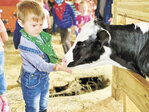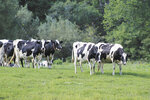

WINDHAM, Maine — Rows of young children walking two-by-two down the road or through the fields across country is a common sight at Mineral Spring Farm near Windham.
Chuck Hall, who owns Mineral Spring Farm, has dairy farmed his entire life. He is assisted full time by Emily Buell.
They house the cows in a 48-stall tiestall barn. The full herd, including youngstock, numbers about 90 head. The farm is a rolling 100 acres, plus rented land, with woods and housing developments nearby.
Hall’s farm neighbors an early childhood education child care center called The School House Learning Center LLC. About three years ago, the two forged a relationship, and now, children and teachers are regular visitors to the farm.
“They bring a lot of joy to our lives,” Buell said.
Young children can be found at the farm often, sometimes multiple times a week. Once a year, Buell gives the center a formal tour of the farm, with specific learning points for the children. An example is a recent lesson about cows and chocolate milk.
“They left knowing all cows make white milk no matter what color they are,” Buell said. “They’re preschool (age), so you have to keep the big ideas little.”
Often, the visits are not formal but allow the children to see and experience the farm, whether it is Buell texting the center to let them know there is a new calf born or that calves are being let out to pasture for the first time.
Buell has begun attending events at the center as well. She has taken a tractor to the center for a touch-a-truck event and brought a calf to the trunk or treat event. The farm also brought wrapped baleage for the center to decorate as a pumpkin in the fall and a snowman in the winter.
Kara Wescott, owner of the child care center, said they are grateful for the relationship and the opportunity to explore beyond their property on foot.
“We realized quickly that they enjoyed us visiting as much as we enjoyed visiting,” Wescott said. “Sometimes, ... it is lost on you how much joy children bring.”
Buell said the children and teachers know and abide by the farm’s ground rules. Wescott said the school talks about safety and the need to have a “quiet, calm body” around the animals.
“We spend a lot of time outdoors ... in all weather,” Wescott said. “So, we talked about how the farm doesn’t stop and the animals must be cared for all the time.”
Mineral Spring Farm is located about 30 minutes from the Atlantic Ocean. Buell said a struggle recently has been extreme storms.
“We’re ... the exhaust pipe of the United States,” Buell said. “When you watch the weather, everything moves across, and it always comes out through Maine.”
Some of this extreme weather includes 6 inches of rain or 60-70 mph wind gusts.
“The (storms are) either a tropical storm or they’re falling apart enough that they’re not considered a tropical storm, but they still pack the rain and the wind,” Buell said.
Another challenge, Hall said, is traffic from a main tourist road they need to use.
Buell agreed.
“To try and get equipment across the road is not pleasant,” Buell said. “Granted, that also is true just in general, but with tourists, it can be kind of rough.”
Buell joined Hall full time eight years ago.
“There’s just something about farming that once you’re in it, people outside it don’t get it,” Buell said. “You fall in love with the cows.”
Hall’s farm has remained similar over the years. He milks in the barn his father built in the 1960s. In the 1970s, a pipeline was added.
“I like working with the cows,” Hall said. “I like the fieldwork. I just like pretty much everything about it.”
The cows stay in the barn during the winter. Spring through fall, the herd is on pasture.
Hall feeds hay, baleage, grain and cornmeal. They do not raise any corn on the farm. They grain the cows twice a day, in the morning and at noon.
During the summer, once the pasture is grazed, the cows eat hay and baleage.
Hall said an important management practice for the farm is feed.
“Just try to put in good feed,” Hall said. “You don’t have to feed as much protein and grain. Just try to save yourself some money.”
Hall starts his morning at 3:30 with feeding, cleaning and bedding. At 5:30 a.m., he and Buell milk cows together.
A high school student helps with evening milking and on Buell’s two days off. Hall’s daughter also assists on Buell’s off days.
Buell said she and Hall do fieldwork together.
“Basically, it’s just a team because what the left hand isn’t doing the right hand has to pick up,” Buell said.
They raise their own forages and most years are also able to sell forage. This year, however, it was too wet to put up enough quality forage.
For their calf program, they feed unpasteurized whole milk. Weaning begins at about 5 weeks. At birth, calves receive First Defense calf boluses. Buell said they switched to whole milk several years ago.
“We noticed a huge difference in our calves,” Buell said. “They’re shinier. They seem to thrive a lot better. In terms of just nutrition, it’s a little bit more consistent.”
Buell plans to continue working with Hall as long as he needs her. Eventually, Hall plans to transition to beef cattle in retirement and is also considering putting in a small sawmill on the farm.
Comments
No comments on this item Please log in to comment by clicking here